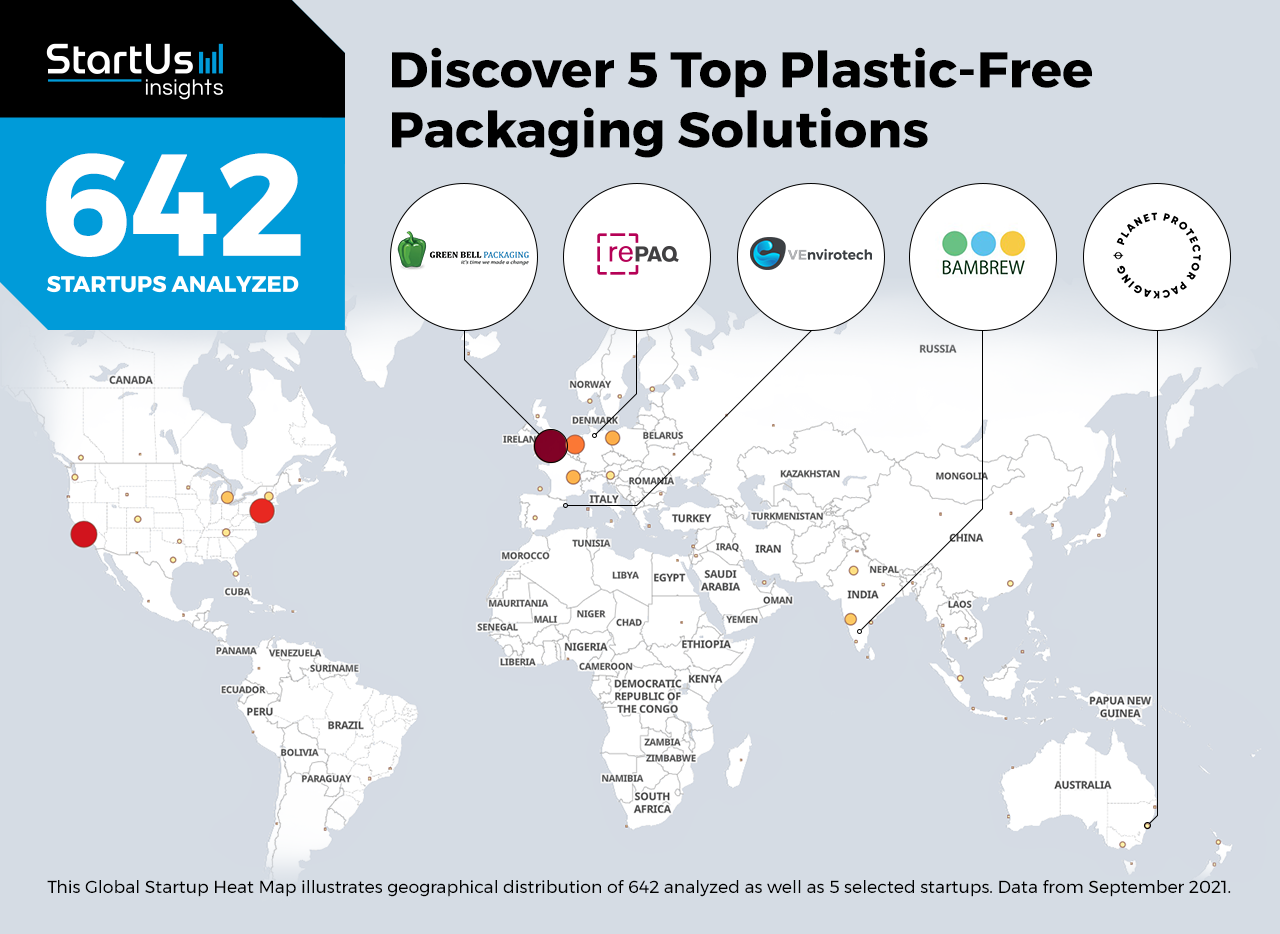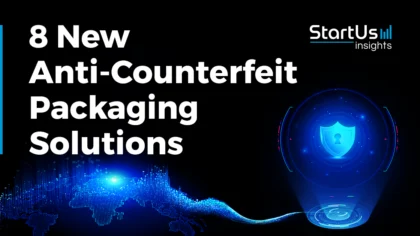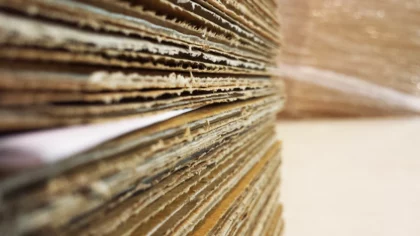Staying ahead of the technology curve means strengthening your competitive advantage. That is why we give you data-driven innovation insights into the packaging industry. This time, you get to discover 5 hand-picked plastic-free packaging solutions.
Global Startup Heat Map highlights 5 Top Plastic-Free Packaging Solutions out of 642
The insights of this data-driven analysis are derived from the Big Data & Artificial Intelligence-powered StartUs Insights Discovery Platform, covering 2 093 000+ startups & scaleups globally. The platform gives you an exhaustive overview of emerging technologies & relevant startups within a specific field in just a few clicks.
The Global Startup Heat Map below reveals the distribution of the 642 exemplary startups & scaleups we analyzed for this research. Further, it highlights 5 packaging startups that we hand-picked based on criteria such as founding year, location, funding raised, and more. You get to explore the solutions of these 5 startups & scaleups in this report. For insights on the other 637 plastic-free packaging solutions, get in touch.
Planet Protector Packaging offers Wool-based Cold Packaging
Polystyrene is a critical component in cold chain storage as it offers thermal insulation at low costs. However, it is one of the most common constituents in floating marine litter and landfills. Styrofoams break down into smaller beads, polluting the water and are consumed by aquatic animals. Besides, styrene is a probable carcinogen and is contaminated by flame retardant chemicals harmful to humans. This is why startups develop polystyrene alternatives for packaging.
Planet Protector Packaging is an Australian startup that develops Woolpack, a wool-based plastic-free packaging solution for cold chain storage. Woolpack fibers absorb moisture from the air, minimizing humidity and condensation to maintain stable temperatures. The startup scours the fibers using soap and hot water and does not use other chemical addition processes, ensuring Woolpack‘s biodegradability and compostability. This, in effect, enables food & beverage, pharma, and seafood companies to eliminate polystyrene components from cold-chain packaging and curb pollution.
VEnvirotech Biotechnology develops Bioplastics
Fossil-fuel-based polymers generate high amounts of toxic substances such as phthalates and brominated flame retardants that pollute the environment. On the other hand, bioplastics are an efficient replacement for plastics in packaging as they are mostly biodegradable and do not produce toxic byproducts. Due to this, startups offer bioplastics solutions for the packaging sector that allows manufacturers to improve their products’ sustainability without losing package quality.
Spanish startup VEnvirotech Biotechnology provides bioplastics for the packaging sector. The startup applies bacteria to convert organic waste into polyhydroxyalkanoate (PHA) bioplastics, which are biodegradable in the environment and suitable for blending with petroleum-based plastics. This allows companies to upcycle their organic waste and sell it to the packaging sector, offering a new revenue stream. VEnvirotech Biotechnology, thus, reduces the carbon footprint and environmental impacts of the packaging companies and their customers.
Green Bell Packaging manufactures BioBags
Consumers are looking for alternatives to plastic packaging owing to growing concerns over the sustainability and carbon footprint of the products they use. Responding to this, brands now prefer sustainable packaging solutions that eliminate plastic usage. Instead, the packaging sector is moving towards alternative materials that offer the same flexibility and durability as conventional polymers. Some startups even offer personalized packaging solutions that allow companies to better connect with their customers while providing eco-friendly options.
Green Bell Packaging is a British startup that creates BioBag, a plastic-free packaging for fashion, pharmacies, and retail stores. It uses sustainably sourced renewable natural materials and vegetable oil derivatives to manufacture an alternative to single-use plastics. In addition, it is naturally biodegradable, cost-effective, and durable for a wide range of applications. Green Bell Packaging further provides packaging personalization through bioprinting, thereby improving brand awareness and customer experience.
Bambrew offers Plant-based Packaging
Common plastics rely on coal, natural gas, and crude oil as ingredients, whereas plastic alternatives such as cellulose- and soy-based plastics use renewable biomass for production. Despite that, the sustainability of plastic alternatives depends on their production methods and degradability. For instance, the production of crop-based bioplastics still requires intensive application of chemicals and pesticides, contributing to emissions. To counter this, startups employ sustainable sourcing and biomass waste to create sustainable plant-based packaging solutions.
Indian startup Bambrew provides sustainable, plant-based packaging for the eCommerce and food sectors. The startup’s handmade, reusable, and biodegradable packaging solution utilizes bamboo, sugarcane, and seaweed as raw materials as well as exercises no chemicals or pesticides during their production. In addition, it relies on smaller communities to develop its products, thereby improving their lifestyle while advancing sustainability. Bambrew also offers its products through subscription services, allowing its customers to pay as they go.
Repaq advances Zero-Waste Printed Film Packaging
Even though most plastics are recyclable, a massive proportion of them reaches landfills due to food and chemical contamination. Moreover, recycling plastic produces inferior quality materials, and only recycled polyethylene terephthalate (rPET) is usable in food products. To further zero-waste packaging solutions, startups offer compostable materials, thereby reducing the chances of microplastic creation and environmental deterioration.
German startup Repaq develops a zero-waste plastic-free printed film packaging solution for food products. The startup’s cellulose packages use certified residual and waste wood from fast-growing plants. Within 180 days, Repaq’s packaging products degrade fully into carbon dioxide and water. Besides, its products are available as garden- and industrial-grade that have different composting conditions, allowing end-consumers and industries to manage their packaging waste at the premise.
Discover more Packaging Startups
Packaging startups such as the examples highlighted in this report focus on bio-based materials, sustainability, and fiber-based packaging. While all of these technologies play a major role in advancing the packaging industry, they only represent the tip of the iceberg. To explore more packaging technologies, simply get in touch to let us look into your areas of interest. For a more general overview, you can download our free Packaging Innovation Report to save your time and improve strategic decision-making.



![Packaging 4.0 : Top 9 Digital Transformation Technologies to Watch [2025]](https://www.startus-insights.com/wp-content/uploads/2025/02/Packaging-4.0-SharedImg-StartUs-Insights-noresize-420x236.webp)





